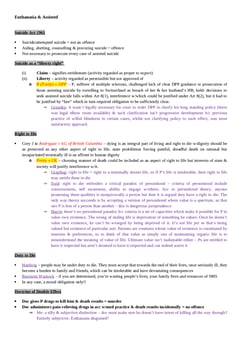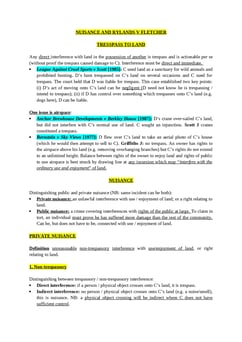Khan v Meadows [2021] UKSC 21
By Oxbridge Law TeamUpdated 04/01/2024 07:17
Reviewed ByOxbridge Law Team
Judgement for the case Khan v Meadows
Table Of Contents
KEY POINTS
- The Court introduced a six-step model to analyse the place of the scope of duty principle by answering the following questions in sequence:
- Is the harm (loss, injury and damage) which is the subject matter of the claim actionable in negligence? (the actionability question);
- What are the risks of harm to the claimant against which the law imposes on the defendant a duty to take care? (the scope of duty question);
- Did the defendant breach his or her duty by his or her act or omission? (the breach question);
- Is the loss for which the claimant seeks damages the consequence of the defendant's act or omission? (the factual causation question);
- Is there a sufficient nexus between a particular element of the harm for which the claimant seeks damages and the subject matter of the defendant's duty of care as analysed at stage 2 above? (the duty nexus question); and
- Is a particular element of the harm for which the claimant seeks damages irrecoverable because it is too remote, or because there is a different effective cause or because the claimant has mitigated his or her loss or has failed to avoid loss which he or she could reasonably have been expected to avoid? (the legal responsibility question)
- Pertaining to the scope of duty question, a defendant is liable only for losses which fall within the scope of his or her duty of care to the claimant.
- Following the SAAMCO principle, the defendant's liability was restricted to the consequences of providing inaccurate information regarding the haemophilia gene, which in this case was limited to the haemophilia itself.
- Professionals may only be liable for the specific consequences directly resulting from the inaccurate information provided, rather than the broader consequences of the claimant's decisions based on that information.
FACTS
- Ms Meadows, the appellant, is the mother of a child with both haemophilia and autism. Before becoming pregnant, she consulted Dr Khan to determine if she carried the haemophilia gene. The blood tests merely confirmed that she did not have haemophilia herself which led her to believe that any child she had would not have haemophilia.
- However, subsequent tests confirmed that she did carry the gene. Ms Meadows claimed damages from Dr Khan for "wrongful birth," arguing that he was responsible for all the consequences of the pregnancy. Dr Khan accepted liability for the child's haemophilia but denied liability for the autism.
- Ms Meadows avers that had she known about her carrier status, she would have undergone prenatal testing for haemophilia. If the foetus had been found to be affected, she would have chosen to terminate the pregnancy to prevent the birth of a child with haemophilia.
- The central issue in the case is whether Dr Khan is liable for the child's autism.
COMMENTARY
- This decision clarifies the application of the SAAMCO principle in cases involving professional negligence. It highlights the importance of distinguishing between advice and information cases and establishes the limits of liability for professionals in providing information.
NOTES
- Defendant Dr Khan is liable for the expenses related to the care of A, Ms Meadows’ child, but only to the extent that those expenses are directly caused by his haemophilia.
- The court held that the duty of care owed by Dr Khan was limited to providing accurate information regarding the haemophilia gene. Thus, the liability for the consequences of the child's autism, which was a separate condition from haemophilia, fell outside the scope of the information provided by Dr Khan. Therefore, Dr Khan was not liable for the child's autism.
Any comments or edits about this case? Get in touch
For Further Study on Khan v Meadows
Need instant answers? Our AI exam tutor is here to help.
Ask questions 🙋 Get answers 📔 It's simple 👁️👄👁️
Our AI is educated by the highest scoring students across all subjects and schools. Join hundreds of your peers today.
Get StartedSimilar Cases
Related Product Samples
These product samples contain the same concepts we cover in this case.
| Medical Law | Medical Negligence Notes (21 pages) |


